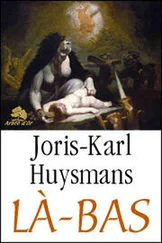Joris-Karl Huysmans - Down There (Là-Bas)
Здесь есть возможность читать онлайн «Joris-Karl Huysmans - Down There (Là-Bas)» весь текст электронной книги совершенно бесплатно (целиком полную версию без сокращений). В некоторых случаях можно слушать аудио, скачать через торрент в формате fb2 и присутствует краткое содержание. Жанр: Классическая проза, на английском языке. Описание произведения, (предисловие) а так же отзывы посетителей доступны на портале библиотеки ЛибКат.
- Название:Down There (Là-Bas)
- Автор:
- Жанр:
- Год:неизвестен
- ISBN:нет данных
- Рейтинг книги:3 / 5. Голосов: 1
-
Избранное:Добавить в избранное
- Отзывы:
-
Ваша оценка:
- 60
- 1
- 2
- 3
- 4
- 5
Down There (Là-Bas): краткое содержание, описание и аннотация
Предлагаем к чтению аннотацию, описание, краткое содержание или предисловие (зависит от того, что написал сам автор книги «Down There (Là-Bas)»). Если вы не нашли необходимую информацию о книге — напишите в комментариях, мы постараемся отыскать её.
Down There (Là-Bas) — читать онлайн бесплатно полную книгу (весь текст) целиком
Ниже представлен текст книги, разбитый по страницам. Система сохранения места последней прочитанной страницы, позволяет с удобством читать онлайн бесплатно книгу «Down There (Là-Bas)», без необходимости каждый раз заново искать на чём Вы остановились. Поставьте закладку, и сможете в любой момент перейти на страницу, на которой закончили чтение.
Интервал:
Закладка:
He tried to spread up the bed, get the tousled blankets together, and plump the pillows, then he lay down.
He put out his lamp. In the darkness his distress increased. With death in his heart he said to himself, "Yes, I was right in declaring that the only women you can continue to love are those you lose.
"To learn, three years later, when the woman is inaccessible, chaste and married, dead, perhaps, or out of France-to learn that she loved you, though you had not dared believe it while she was near you, ah, that's the dream! These real and intangible loves, these loves made up of melancholy and distant regrets, are the only ones that count. Because there is no flesh in them, no earthly leaven.
"To love at a distance and without hope; never to possess; to dream chastely of pale charms and impossible kisses extinguished on the waxen brow of death: ah, that is something like it. A delicious straying away from the world, and never the return. As only the unreal is not ignoble and empty, existence must be admitted to be abominable. Yes, imagination is the only good thing which heaven vouchsafes to the skeptic and pessimist, alarmed by the eternal abjectness of life."
CHAPTER XIV
From this scene he had learned an alarming lesson: that the flesh domineers the soul and refuses to admit any schism. The flesh decisively does not intend that one shall get along without it and indulge in out-of-the-world pleasures which it can partake only on condition that it keep quiet. For the first time, reviewing these turpitudes, he really understood the meaning of that now obsolete word chastity , and he savoured it in all its pristine freshness. Just as a man who has drunk too deeply the night before thinks, the morning after, of drinking nothing but mineral water in future, so he dreamed, today, of pure affection far from a bed.
He was still ruminating these thoughts when Des Hermies entered.
They spoke of amorous misadventures. Astonished at once by Durtal's languor and the ascetic tone of his remarks, Des Hermies exclaimed, "Ah, we had a gay old time last night?"
With the most decisive bad grace Durtal shook his head.
"Then," replied Des Hermies, "you are superior and inhuman. To love without hope, immaculately, would be perfect if it did not induct such brainstorms. There is no excuse for chastity, unless one has a pious end in view, or unless the senses are failing, and if they are one had best see a doctor, who will solve the question more or less unsatisfactorily. To tell the truth, everything on earth culminates in the act you reprove. The heart, which is supposed to be the noble part of man, has the same form as the penis, which is the so-called ignoble part of man. There's symbolism in that similarity, because every love which is of the heart soon extends to the organ resembling it. The human imagination, the moment it tries to create artificially animated beings, involuntarily reproduces in them the movements of animals propagating. Look at the machines, the action of the piston and the cylinder; Romeos of steel and Juliets of cast iron. Nor do the loftier expressions of the human intellect get away from the advance and withdrawal copied by the machines. One must bow to nature's law if one is neither impotent nor a saint. Now you are neither the one nor the other, I think, but if, from inconceivable motives, you desire to live in temporary continence, follow the prescription of an occultist of the sixteenth century, the Neapolitan Piperno. He affirms that whoever eats vervain cannot approach a woman for seven days. Buy a jar, and let's try it."
Durtal laughed. "There is perhaps a middle course: never consummate the carnal act with her you love, and, to keep yourself quiet, frequent those you do not love. Thus, in a certain measure, you would conjure away possible disgust."
"No, one would never get it out of one's head that with the woman of whom one was enamoured one would experience carnal delights absolutely different from those which one feels with the others, so your method also would end badly. And too, the women who would not be indifferent to one, have not charity and discretion enough to admire the wisdom of this selfishness, for of course that's what it is. But what say, now, to putting on your shoes? It's almost six o'clock and Mama Carhaix's beef can't wait."
It had already been taken out of the pot and couched on a platter amid vegetables when they arrived. Carhaix, sprawling in an armchair, was reading his breviary.
"What's going on in the world?" he asked, closing his book.
"Nothing. Politics doesn't interest us, and General Boulanger's American tricks of publicity weary you as much as they do us, I suppose. The other newspaper stories are just a little more shocking or dull than usual.-Look out, you'll burn your mouth," as Durtal was preparing to take a spoonful of soup.
"In fact," said Durtal, grimacing, "this marrowy soup, so artistically golden, is like liquid fire. But speaking of the news, what do you mean by saying there is nothing of pressing importance? And the trial of that astonishing abbé Boudes going on before the Assizes of Aveyron! After trying to poison his curate through the sacramental wine, and committing such other crimes as abortion, rape, flagrant misconduct, forgery, qualified theft and usury, he ended by appropriating the money put in the coin boxes for the souls in purgatory, and pawning the ciborium, chalice, all the holy vessels. That case is worth following."
Carhaix raised his eyes to heaven.
"If he is not sent to jail, there will be one more priest for Paris," said Des Hermies.
"How's that?"
"Why, all the ecclesiastics who get in bad in the provinces, or who have a serious falling out with the bishop, are sent here where they will be less in view, lost in the crowd, as it were. They form a part of that corporation known as 'scratch priests.'"
"What are they?"
"Priests loosely attached to a parish. You know that in addition to a curate, ministrants, vicars, and regular clergy, there are in every church adjunct priests, supply priests. Those are the ones I am talking about. They do the heavy work, celebrate the morning masses when everybody is asleep and the late masses when everybody is doing. It is they who get up at night to take the sacrament to the poor, and who sit up with the corpses of the devout rich and catch cold standing under the dripping church porches at funerals, and get sunstroke or pneumonia in the cemetery. They do all the dirty work. For a five or ten franc fee they act as substitutes for colleagues who have good livings and are tired of service. They are men under a cloud for the most part. Churches take them on, ready to fire them at a moment's notice, and keep strict watch over them while waiting for them to be interdicted or to have their celebret taken away. I simply mean that the provincial parishes excavate on the city the priests who for one reason or another have ceased to please."
"But what do the curates and other titulary abbés do , if they unload their duties onto the backs of others?"
"They do the elegant, easy work, which requires no effort, no charity. They shrive society women who come to confession in their most stunning gowns; they teach proper little prigs the catechism, and preach, and play the limelight rôles in the gala ceremonials which are got up to pander to the tastes of the faithful. At Paris, not counting the scratch priests, the clergy is divided thus: Man-of-the-world priests in easy circumstances: these are placed at la Madeleine and Saint Roch where the congregations are wealthy. They are wined and dined, they pass their lives in drawing-rooms, and comfort only elegant souls. Other priests who are good desk clerks, for the most part, but who have neither the education nor the fortune necessary to participate in the inconsequentialities of the idle rich. They live more in seclusion and visit only among the middle class. They console themselves for their unfashionableness by playing cards with each other and uttering crude commonplaces at the table."
Читать дальшеИнтервал:
Закладка:
Похожие книги на «Down There (Là-Bas)»
Представляем Вашему вниманию похожие книги на «Down There (Là-Bas)» списком для выбора. Мы отобрали схожую по названию и смыслу литературу в надежде предоставить читателям больше вариантов отыскать новые, интересные, ещё непрочитанные произведения.
Обсуждение, отзывы о книге «Down There (Là-Bas)» и просто собственные мнения читателей. Оставьте ваши комментарии, напишите, что Вы думаете о произведении, его смысле или главных героях. Укажите что конкретно понравилось, а что нет, и почему Вы так считаете.












